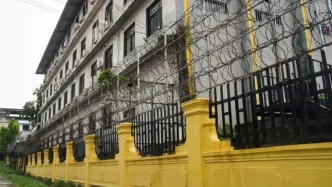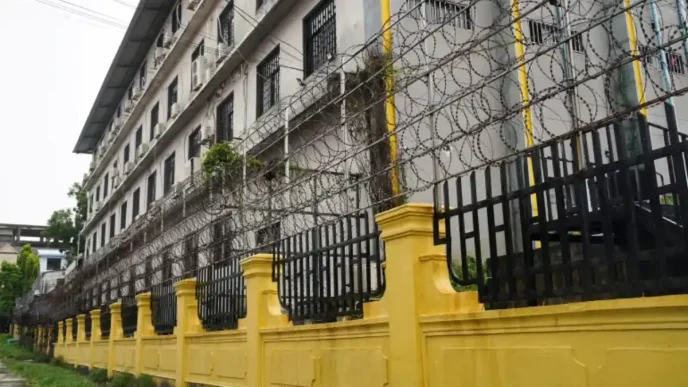Philippine Defence Secretary Gilberto Teodoro Jr. has issued a stark warning to the Association of Southeast Asian Nations (Asean), urging the bloc to break its silence on regional violations and unite against mounting security challenges, particularly in the contested South China Sea. Speaking at the Asean Defence Ministers’ Meeting in Penang, Malaysia, Teodoro underscored the existential threat to smaller states in the region, framing the issue as not just a regional concern but a global one with far-reaching implications for international stability.
A Call for Cohesion
Teodoro’s address highlighted Asean’s historic role in maintaining peace in Southeast Asia, a region that has enjoyed relative stability since the end of World War II. “However, this peace is now under threat—not due to our incapacity to preserve it, but because of the absence of unanimity on key issues,” he cautioned. Quoting President Ferdinand Marcos Jr. from a recent Asean Summit in Vientiane, Laos, he added, “Silence in the face of violations diminishes Asean.”
At the heart of his message was the ongoing dispute in the West Philippine Sea, a portion of the South China Sea claimed by Manila. While Teodoro refrained from naming specific actors, the context of his remarks pointed to escalating tensions with Beijing, which continues to assert expansive claims over the strategic waterway despite a 2016 arbitral ruling by the Permanent Court of Arbitration that invalidated its legal basis. The ruling, hailed as a landmark decision under the United Nations Convention on the Law of the Sea (UNCLOS), has been repeatedly disregarded by China, fuelling friction with Asean member states like the Philippines and Vietnam.
“At the heart of this matter is the existential right of smaller states—Asean member states in particular—to live in peace, secure their borders, and pursue their own destiny,” Teodoro declared. His words reflect a growing frustration among smaller nations in the bloc, which often find themselves caught between major powers vying for influence in one of the world’s most geopolitically sensitive regions.
A Global Issue, Not Just Regional
The South China Sea is more than a regional flashpoint; it is a critical artery for global trade, with an estimated $3.4 trillion in annual commerce passing through its waters. Control over the area offers not only economic leverage but also strategic military dominance, given its proximity to key shipping lanes and potential underwater resources. For the Philippines, the stakes are particularly high, as the disputed waters encompass parts of its exclusive economic zone (EEZ), vital for fishing and potential energy exploration.
Teodoro framed the issue as a test for the rules-based international order, arguing that threats to Philippine sovereignty and jurisdiction in the West Philippine Sea have ripple effects beyond Southeast Asia. “This is not merely a domestic or regional concern but a global issue that impacts the stability of the international system,” he told his counterparts. The implication is clear: if Asean fails to address such challenges collectively, it risks undermining its credibility as a unifying force for regional stability.
Strengthening Operational Ties
Beyond rhetoric, Teodoro proposed actionable steps to bolster Asean’s response to shared threats. He called for enhanced operational cooperation through expanded joint patrols, military exercises, and intelligence-sharing among member states’ defence forces. Such measures, he argued, would build trust and foster a sense of collective security in a region often fragmented by differing national interests.
He also pointed to the dangers of external interference, warning against “coercion in whatever form” and urging Asean nations to exchange information on foreign activities that undermine their societies. Among the transnational issues he highlighted were online scams, human trafficking, and illegal migration—problems that transcend borders and require coordinated action. “We should resist attempts to sow division within Southeast Asia,” he stressed, hinting at broader geopolitical rivalries that exploit regional vulnerabilities.
Navigating Asean’s Internal Divisions
Teodoro’s appeal for unity comes at a time when Asean itself is grappling with internal divisions over how to address the South China Sea dispute. While countries like the Philippines and Vietnam have been vocal about their concerns, others within the bloc, such as Cambodia and Laos, have historically maintained closer ties with Beijing, often prioritising economic partnerships over confrontation. This lack of consensus has hampered Asean’s ability to present a united front, a frustration echoed in Teodoro’s remarks about the absence of “unanimity on key issues.”
Analysts suggest that the Philippines’ push for a stronger Asean stance may be an uphill battle. “Asean operates on the principle of non-interference and consensus, which often leads to paralysis on contentious issues like the South China Sea,” notes Dr. Maria Lim, a geopolitical expert based in Manila. “While Teodoro’s call for cohesion is compelling, translating it into action will require deft diplomacy to align the diverse interests of member states.”
If Asean were to adopt a more assertive posture, as Teodoro advocates, it could potentially shift the dynamics of regional power play. Joint patrols and intelligence-sharing, for instance, might serve as a deterrent to unilateral actions in disputed waters. However, such steps could also risk escalating tensions with external powers, a delicate balance that Asean has long sought to navigate through dialogue rather than confrontation.
Commitment to Diplomacy
Despite the urgency of his tone, Teodoro reaffirmed the Philippines’ commitment to multilateralism and peaceful resolution of disputes in line with international law. “We may not always agree, but the spirit of Asean compels us to cooperate where we can, consult where necessary, and act when we must,” he concluded. This nod to diplomacy reflects Manila’s broader strategy of balancing assertiveness with engagement, often through platforms like Asean and partnerships with allies such as the United States, Japan, and Australia.
The South China Sea remains a litmus test for Asean’s relevance in an increasingly polarised world. For smaller states like the Philippines, the bloc represents a critical buffer against the pressures of great power rivalry. Yet, as Teodoro’s speech underscores, the organisation’s effectiveness hinges on its willingness to confront violations head-on rather than retreating into silence.
Broader Implications for Regional Stability
The implications of Teodoro’s address extend beyond the immediate context of the South China Sea. His emphasis on the “existential right” of smaller states resonates with broader debates about sovereignty and self-determination in a region shaped by colonial histories and ongoing geopolitical flux. For Asean, the challenge lies in reconciling its foundational principles of non-interference with the urgent need to address shared threats—a tension that has defined much of its history.
Moreover, the issues Teodoro raised—transnational crime, external coercion, and societal vulnerabilities—point to the interconnected nature of modern security challenges. Online scams and human trafficking, for instance, are not merely criminal enterprises but symptoms of deeper structural inequalities that Asean must tackle collectively. If left unaddressed, such problems could erode public trust in governance, further complicating the bloc’s efforts to maintain stability.
As the Asean Defence Ministers’ Meeting concluded in Penang, Teodoro’s words lingered as both a warning and a rallying cry. Whether the bloc can rise to the challenge remains an open question, but the Philippine defence chief’s message was unequivocal: in the face of mounting threats, silence is no longer an option. For Asean, the path forward will require not just dialogue but decisive action to safeguard the fragile peace it has worked so hard to build.














